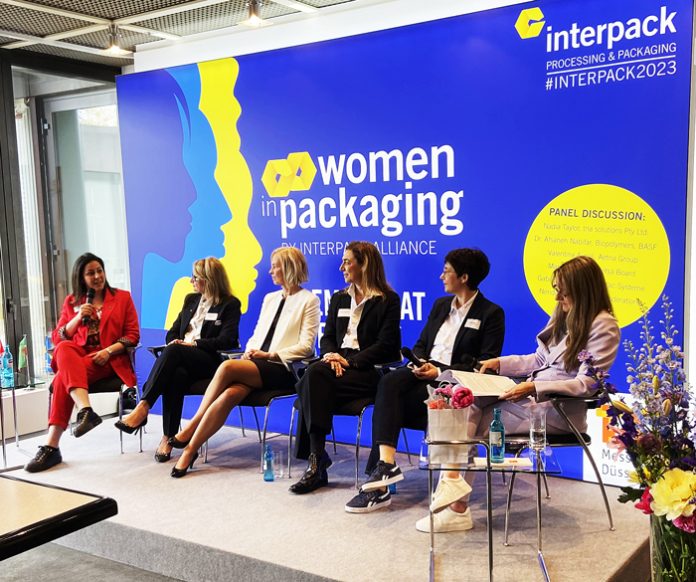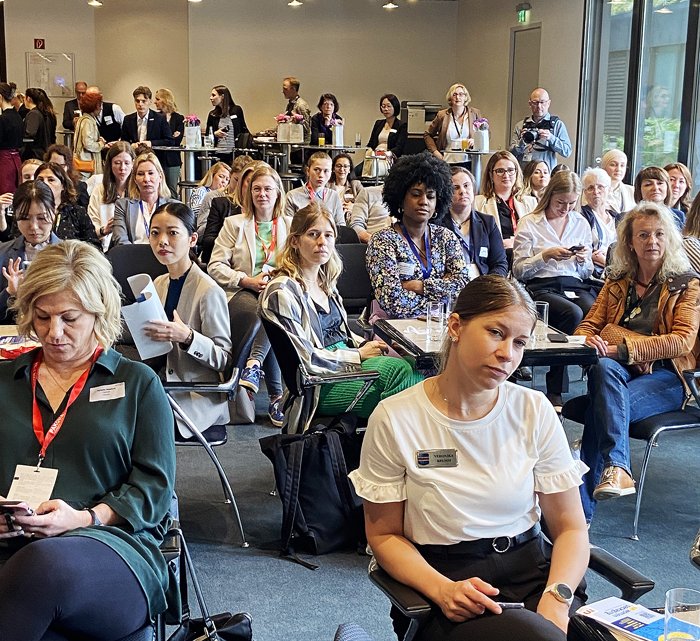
The first Women in Packaging networking event at Interpack took place on 8 May 2023 at the show’s International Lounge, which could hardly contain the more than 150 attendees. Towards the end, the place was so packed that much of the networking had to be done in the corridor during a stand-up lunch. For about 90 minutes, the event was introduced by a discussion panel of five industry leaders exposing their track record and experiences as women in the packaging industry. The discussion was moderated by Nerida Kelton, executive director of the Australian Institute of Packaging, vice president of Sustainability & Save Food at the World Packaging Organization WPO, and a member of the International Packaging Press Organisation IPPO. She has worked in the packaging industry for over 25 years as a lecturer and trainer committed to best practices in sustainable and circular packaging design.
During the panel discussion, Dr Afsaneh Nabifar, currently head of Global Market Development Biopolymers at BASF, talked about her track record as a chemical engineer since she left Iran 18 years ago and did a PhD in Polymer Science and Engineering at Waterloo University in Canada. She joined BASF in 2012, where she held various positions in the areas of research and development, and market and business development in a number of business areas supplying materials to the packaging industry. Aside from working for several associations for plastic and paper packaging, she is a board member of the European Bioplastic Association EUBP and the British Bio-based and Biodegradable Industry Association BBIA.
Dr Nabifar said that she worked in several teams where she was the only woman scientist, but that the company culture at BASF has been such that she always felt respected and trusted. She held that trust has to be built consciously in any team, training one’s self-confidence as one trains one’s muscles. Her advice to women in the industry was to stay authentic and to dare to think out of the box.
Nadia Taylor, with a career of 40 years in the industry after emigrating from Egypt to Australia, described how in 1982 she and her husband founded tna solutions, starting with the production of bagmaking equipment. Currently, tna offers integrated solutions for food processing and packaging with 14,000 systems installed in more than 120 countries.
Ms Taylor also held the opinion that, in order to be successful in the industry, the main challenge would be to learn how to deal with a variety of company cultures, something women tend to be good at. In her eyes, being sensitive to other cultures and learning at least some words in other languages would be the best way to be respected as a woman and a professional. Her advice to other women: keep fighting for equal pay and – follow your dreams.
Valentina Aureli, CEO of the Aetna Group, a family enterprise with factories in Northern Italy, Brazil, China, Germany, and the USA, explained that she gained her experience in the international finance sector at Rothschild Banking, and how for the past twenty years she and her brother led their father’s company Aetna towards constant growth at the global level with its main brands Robopac and Ocme.
Ms Aureli expressed some of her thoughts on the combination of rational and emotional decisions. In her opinion, women tend to emotional approaches and could learn from men’s more rational approaches. She also held that it was important to keep a balance between a professional career and personal happiness, “We must be the same person at home and at work.”
Marjo Halonen, vice president of Communications at Metsä Board Corporation since 2017, spoke about her passion for sustainable materials driving the shift towards a circular economy. Before joining Metsä Board, she held positions in marketing and communication at Outokumpu, a manufacturer of stainless steel, and Specsavers, an optical chain store in Finland.

Photo Packaging South Asia
For Ms Halonen, the most important issue was to focus on the best moments of one’s life in order to gain confidence. Her advice for women in the industry was to take stock of their talent and, besides setting the bar high in challenging oneself, to make themselves visible in the company. According to her, men are better at marketing themselves, while women often limit themselves to marketing the company. Women should learn more from men and should benefit from monitoring and coaching programs.
Gabi Bauer, for the past two years head of Marketing & Communication at Uhlmann Pac-Systeme, explained her responsibilities with regard to the company’s digital transformation and adaptations to each national market as a leading systems supplier for pharmaceutical packaging. Her track record includes 30 years of experience across widely different industries, from PWC and IBM to windows-and-doors supplier GEZE, and from the hotel sector to consulting.
Ms Bauer spoke a lot about gaining self-confidence by accepting the fact that one makes mistakes along the way. The main issue in a woman’s career would be to take opportunities and push forward while accepting different approaches. In her opinion, women are excellent team builders when applying a mix of emotional and rational approaches, and should be more aware of their power.
The panel’s main concern was the fact that women in leading positions are still underrepresented in the packaging and processing industries. For this reason, the women on the panel represented highly educated and successful managers as well as founders of companies. There was a lot of talk about the confidence and respect needed for building women’s leadership careers, whereas the industry’s women working in ‘lower’ technical, administrative, and ancillary jobs were rather absent from the conversation. Nevertheless, the panel concluded by acknowledging that the packaging and processing industries have to be made more attractive for young women by initiating image campaigns for the sector, introducing mentoring programs, and creating more equal opportunities and attractive working conditions.








